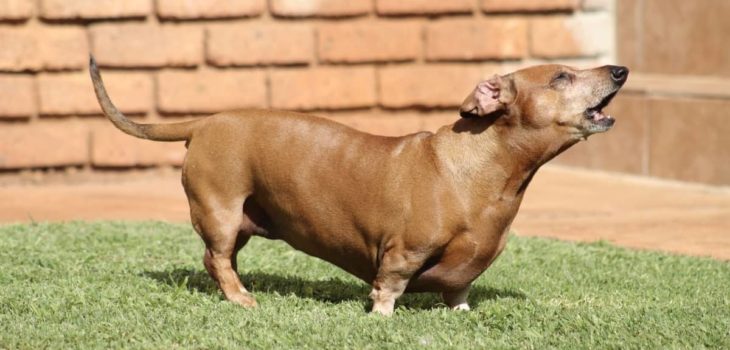Maintaining a healthy weight is crucial for your Dachshund’s overall well-being. Here are five ways to help you figure out if your dog is overweight:
1. Body Condition Score (BCS):
- Use a body condition scoring system to assess your Dachshund’s weight. The system typically ranges from 1 to 9, with 1 being excessively thin and 9 being obese. Aim for a score of 4 to 5, where the ribs are palpable without excess fat covering.
2. Feel for Ribs and Spine:
- Run your hands along your Dachshund’s sides. You should be able to feel the ribs without pressing too hard. If the ribs are difficult to feel due to a layer of fat, your dog may be overweight. Similarly, the spine should be easily felt without excess padding.
3. View from Above:
- When looking down at your Dachshund from above, you should see a slight hourglass figure. There should be a noticeable waist between the ribcage and hips. If the body appears more rectangular or lacks a defined waist, your dog might be overweight.
4. Profile View:
- View your Dachshund from the side. The abdomen should be tucked up, not sagging. If the abdomen is sagging, and there’s a lack of an upward tuck, it could indicate excess weight.
5. Observing Behavior and Energy Levels:
- Changes in behavior and energy levels can also indicate weight issues. If your Dachshund is lethargic, unwilling to engage in physical activity, or struggling during walks, it may be due to excess weight.
Tips for Weight Management:
- Consult Your Vet:
- If you’re unsure about your Dachshund’s weight, consult your veterinarian. They can provide guidance on the ideal weight for your dog’s breed, age, and health status.
- Control Portion Sizes:
- Measure your dog’s food to control portion sizes. Avoid overfeeding, and be mindful of treats and snacks, as these can contribute significantly to calorie intake.
- Regular Exercise:
- Ensure your Dachshund gets regular exercise. Tailor the exercise routine to your dog’s age and health condition, and aim for activities that promote a healthy weight.
- Healthy Treats:
- Choose healthy treats or use portions of your dog’s regular food for training treats. Avoid high-calorie treats and snacks.
- Weight-Loss Plan:
- If your Dachshund is overweight, work with your vet to create a gradual and safe weight-loss plan. Rapid weight loss can be detrimental to your dog’s health.
Remember, weight management is a key aspect of your Dachshund’s overall health. Regular veterinary check-ups can help monitor your dog’s weight and address any concerns early on.


